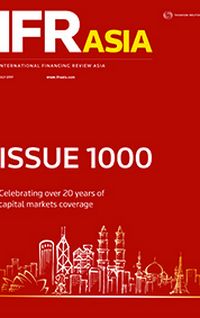In 1995, I relocated to Hong Kong from London, where I was reporting on UK and European equities for IFR, to help launch a sister publication covering Asia’s rapidly developing capital markets. For a British national, the promise of witnessing the divestment of one of the last vestiges of empire in the return of Hong Kong to China in 1997 was too good to resist.
Notwithstanding the uncertainties attached to the projects, both the launch of IFR Asia and the handover of Hong Kong passed without incident. But by July 1997, Asia’s economic skies were darkening as the contagion of the Asian financial crisis took hold.
The depth of the crisis prompted some to question the survival of an Asia-focused magazine launched in the teeth of a crisis. However, as in subsequent upheavals, the unravelling and rebuilding of financial markets were to provide ample grist to the journalist’s mill.
Perhaps the most spectacular fall from grace in the region was that of high-flying Peregrine Investment Holdings, which had been founded in 1988 by two former Citibank employees.
In just 10 years, with the support of a number of influential Hong Kong tycoons and under the stewardship of its patrician chairman, Philip Tose, Peregrine had grown from a niche player to Asia’s leading stock underwriter with close to 2,000 employees.
However, at the end of October 1997, speculation over the extent of its losses as a result of the volatility in South-East Asia had knocked the share price down to HK$7.50 from a high of HK$18.90 earlier in the year.
The firm published a full-page press advertisement announcing its intention to issue a second interim statement and bring forward its fiscal year-end from December to November to allow full audited accounts for the period ending November 30 to be available in January 1998.
“Most analysts applauded the speed with which the firm moved to staunch speculation and reassure its clients, counterparties, bankers, shareholders and employees,” noted IFR Asia at the time.
Peregrine’s US$400m exposure to Indonesian companies, including a US$265m bond it underwrote for taxi firm Steady Safe, eventually delivered the coup de grace after a stunning 50% collapse in value of the Indonesian rupiah in the first week of 1998.
Proposals to creditor banks at meetings on January 11 were unsuccessful and, on the following day, Peregrine announced that it was taking preliminary steps to go into liquidation, which was enough to spark an 8.9% decline in the Hang Seng Index.
The failure of any bank is noteworthy, but Peregrine’s demise became a symbol of Asia’s excesses in the run-up to the crisis. Initially, the iconic and unconventional firm’s success in establishing strong ties with Beijing and in marketing itself as a local presence with intimate understanding of the needs of its clients was widely admired. Peregrine in 1997 had even consolidated its profile by agreeing to sponsor Hong Kong’s biggest sporting event, the Sevens rugby tournament.
“The model was undoubtedly a success. The firm pioneered the Asian FRN market, which successfully provided large amounts of capital to Asian borrowers and assets for Korean banks … But like many other Asian companies, the firm was organised along the lines of a conglomerate. A collection of independent divisions and, in the case of Peregrine, not enough controls and compliance structures in place,” noted IFR Asia (Issue 44).
But Peregrine’s appetite for risk was increasingly viewed with suspicion. Head of fixed income Andre Lee seemingly “had carte blanche to operate as an independent bank within the bank”. Independence provided the flexibility needed to maximise profits “but obviously there were no controls or compliance mechanisms in place to protect the firm’s capital and shareholders.” (ibid.).
Tose himself, a former racing driver, was also frequently criticised for a style that came off to some as imperious and arrogant.
Hubris was not in evidence at an off-the-record meeting I had with Tose in the weeks before Peregrine’s collapse. He was beyond courteous, open and charming. However, a couple of months later, at a public meeting in the Furama Hotel in Hong Kong, he singularly failed to display any sense of noblesse oblige. The conference announced the failure of Zurich Centre Investments, part of Zurich Group, and one of Peregrine’s principal creditors, First Chicago, to step into the breach to rescue the company.
Tose averted his gaze from those present, looking above their heads into the middle distance, perhaps musing on the fact that Peregrine’s weekly analytical report, Greed and Fear, had maintained a bullish stance on the Indonesian rupiah until the end.
Mark Panday was an equities reporter and editor at IFR and IFR Asia from 1995 to 2000
To view all special report articles please click here and to see the digital version of this report please click here .
To purchase printed copies or a PDF of this report, please email gloria.balbastro@thomsonreuters.com .


